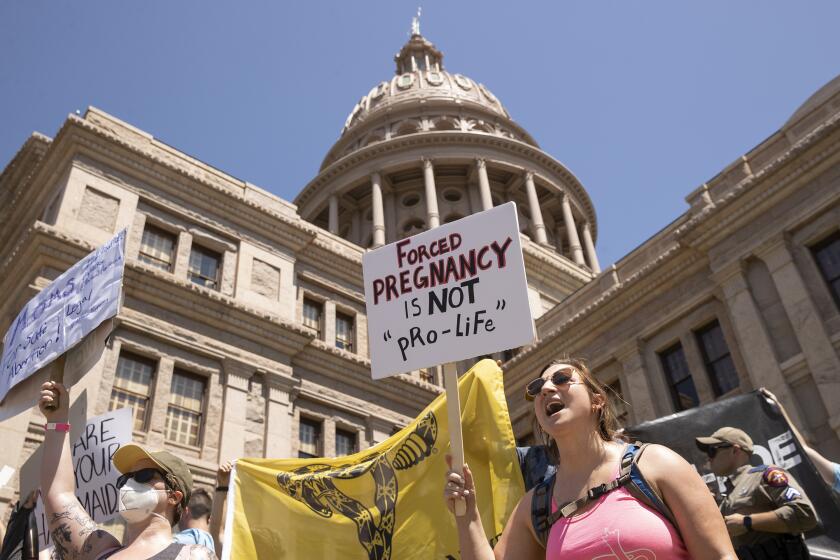He Served America Anyway
When World War II broke out, and the look of America was changing overnight to khaki, a young college teacher and scholar named John Hope Franklin went to see a Navy recruiter.
“What can you do?” said the recruiter.
The teacher and scholar thought about that. “Well, I have four gold medals in typing,” he said. “I can run an office. I have a PhD in history from Harvard.”
“Well, you have everything but color, then,” said the recruiter. He didn’t say “the right color,” nor did he need to.
“I’m sorry for taking your time,” said the teacher. “I thought the country was in a terrible emergency. I thought the country was bleeding.”
An old dignified man, about whom nothing seems very old, or at least lacking in energy, draws his lips into a thin, flat line. His eyes seem momentarily to go hard as agates. “I got up and left. I left with one vow: They will never get me. I said to myself, ‘They don’t deserve you.’ When they slapped me in the face like that, that was it, it was over.”
And they didn’t get him, either. The scholar, who was on his way to one of the great postwar academic careers, spent the next several years skillfully and legally avoiding the war.
This story has fallen out of Franklin almost by accident. The scholar, who’s 82 now, had made a passing reference to his older brother, Buck Franklin, seven years his senior, who died 50 years ago this summer when Franklin was reading proofs on what was to become his masterwork, “From Slavery to Freedom.” A visitor asked about the cause of the premature death.
The preeminent African American historian and storyteller of race in our century waved away the semi-hidden topic. “Oh, I don’t want to get into it,” he said. “The Army wrecked him. He had a terrible life.”
As he said it, he seemed to be looking off to some middle distance, where so many painful family stories must reside. “I try not to describe myself being bitter about anything,” he said. “But I certainly hold this country responsible for a lot. One of them would be what happened to Buck.”
He said this much about his brother:
“He went to the Army. I was unsuccessful in getting in; he wasn’t. So he’s in and a white sergeant said, ‘I will dedicate my life to making sure you do nothing in this Army but peel potatoes.’ You see, he’d been a school principal and an honors graduate of Fisk University. After the war, Buck had a kind of breakdown. He died in a veterans hospital in Richmond, Va.”
When you go to visit Franklin, you get, in addition to everything else, riveting stories told economically. Maybe it’s the art of the pure historian in him: Penetrate to the core of what happened, analyze it down to the bone, and then just relate it, with eloquence and simplicity. Without adornment.
Early in June, this revered university figure was named head of President Clinton’s national advisory board on race. Over the next year, the panel will seek to direct a national conversation on race relations, producing recommendations for White House action by next summer. It’s a post that seems ripe for misunderstanding and criticism.
“I am not sure this is an honor,” the appointee said after he was named. “It may be a burden.” For now, he says he wishes to reserve judgment on what may or may not result, and what may end up in whatever reports get written. The group of seven (the board is made up of two blacks, three whites, a Latino and a Korean American) has had one official meeting, mildly fractious. “I’ll say this,” says the chairman. “I’m very optimistic. Optimism fuels your goals, after all.”
*
Franklin is the preeminent historian of race in our century for many reasons, not least because he sought to write the truth without regard for ideology or color. His work, in about a dozen books and in essays and monographs, has helped shape and change the way we think about race in this country. He is legendary, as Henry Louis Gates Jr. of Harvard explains, not because he built a high place in a scholarly tradition, but because he pretty much created the tradition.
“What he did was define the genre,” Gates says. “He doesn’t know this, but there are several of us up here at Harvard who call him the Godfather.”
W.E.B. DuBois and Carter Woodson, to name only two, were there in African American scholarship ahead of Franklin. But Franklin’s legacy is that he was able to turn the whole panoramic canvas of African American study into something highly professional and sophisticated. A discipline.
Consider: “From Slavery to Freedom: A History of African Americans” was first published five decades ago, has 3 million copies in print, is in its seventh edition--and is still regarded as the core text for black history survey courses on uncounted campuses across the country.
Many years ago, Roy Wilkins of the NAACP wrote in the New Republic: “John Hope Franklin is an uncommon historian who has consistently corrected in eloquent language the misrecording of this country’s rich heritage.”
Early this summer, PBS ran an hourlong documentary on Franklin. What shone through was his honesty, the unflinching answers on every topic. The late Charles Kuralt narrated. The program traced Franklin from his beginning in 1915 in an all-black frontier community named Rentiesville, Okla.
It was impossible to watch the show and not come away with the feeling of how strongly Franklin believes in the idea of an integrated society. He said he “would not countenance,” would not be interested in “the kind of experimentation that would suggest that an all-black community or even an all-black school . . . would be good for self-esteem or for preparation to live in the larger community.”
Franklin didn’t only chronicle the story of race and civil rights in this century, he lived much of it. He was in Montgomery, Ala., with Martin Luther King Jr. He worked on Brown vs. Board of Education with Thurgood Marshall. He was there on the Mall for the great March on Washington in August 1963. He was able to get out of the academy and experience history firsthand and in its rough draft.
*
He lives, not exactly quietly, in a handsome red-brick house on a small Durham hillside. It is filled with books--this you might expect. What you might not expect is that his body, in its ninth decade, is lean and remarkably fit, though it’s his mind that seems even more remarkably fit.
He’s already paid the goldfish out back a visit as well as gone out to his not impeccably neat greenhouse, full of many varieties of orchids. An assistant in another room has been grabbing the phone calls, which have probably always come fast and furious at his residences, but faster and more furious since June 12, when Franklin was named to lead the White House panel.
It seems reasonable to ask if he admires Clinton and his presidency. With slight hesitancy: “Yes, I do. You see, when you say that, it’s a sweeping question. This doesn’t mean I’m not critical of some of his policies and some of the things he has done.”
Some commentators have viewed Clinton’s focus on race with a jaundiced eye, believing that with an economy ripping along and a country at peace, a somewhat unloved president appears to grow more fretful of his place in history. The legacy of slavery may be the sorrow that defines us as Americans more than anything else. But a White House panel on race relations might end up as part of an empty gesture. Is it possible Franklin and his towering reputation are being used by the powers-that-be in Washington?
“Oh, they’ve already said so, the detractors,” Franklin says. “It’s in the air, anyway. But it doesn’t disturb me. For one thing, even if President Clinton’s motives are very different from mine, it doesn’t mean I don’t have an important opportunity here to address the whole question of race in this country. But I happen to know for a fact that President Clinton knows an awful lot about my views and respects them.
“The naysayers and detractors can say what they want. What I’m saying is that if he wanted to use somebody, maybe he ought to be using somebody that can be used a little easier.”
*
For all the sense of energy and continuing work in this household, there is a loneliness here too. It’s the absence of a partner. Franklin’s wife, Aurelia, has Alzheimer’s disease. She’s in a nearby nursing home.
“I’m not right unless I go to see her every day,” he says. “I can’t function. Fifty-seven years. Well, it’s longer than that, really, because we were dating at 16. So it’s 57, plus 9.”
He started courting Aurelia Whittington at Fisk University in Nashville in 1931. His hand is touching the metal edge of a framed photograph on an end table. He turns the picture sideways, so you can see. “Here she is,” he says. It’s a faintly colorized sepia studio print that speaks indelibly of its time and place. The woman in the photograph, who looks about 25, is gazing back over her shoulder. She’s wearing a satiny dress with slits in the back. Her gleaming hair is gathered in a bun.
She’s now in a Chapel Hill facility--”10 or 12 minutes from here. I don’t stay long. The length of the visit means nothing, because she has no sense of time. But she’s always glad to see me, I think. She still recognizes me.”
Franklin’s two sons are both engaged in scholarly pursuits. His biological son, John Whittington Franklin, lives in the Washington area and works at the Smithsonian. His adopted son, Bouna Ndiaye, lives with him and works at North Carolina Central University.
C. Vann Woodward, emeritus historian at Yale, says that he has known Franklin since about 1946 and that he has always been as admirably direct as he is now. They were both at the Library of Congress after the war, researching books. Woodward came to Franklin’s cubicle and asked if they could have lunch the next day. But the next day was Saturday. No restaurant on Capitol Hill would have a black man and white man sitting down together.
“Vann, you know the only place we can have lunch together is at the Capitol, in the congressional dining room, or at the Supreme Court, and they’re not open tomorrow,” Franklin said. They waited.
Gerald Early holds a literature chair at Washington University in St. Louis. It’s Franklin’s bearing, along with everything else, that makes him the role model he is, Early says. You get the directness, without the bitterness. The elegance, without ego or showiness.
Franklin’s place on the president’s panel? “My feeling, when I heard about it, is that he’s giving more grandeur to it than he’s getting from it,” Early says. “I think he can survive [any criticism]. He can transcend it. In some ways, I admire the fact he’s still willing to get out in the arena and engage it, so to speak.”
More to Read
Start your day right
Sign up for Essential California for news, features and recommendations from the L.A. Times and beyond in your inbox six days a week.
You may occasionally receive promotional content from the Los Angeles Times.






